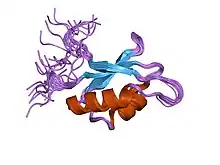Negative elongation factor
In molecular biology, the NELF (negative elongation factor) is a four-subunit protein complex (NELF-A, NELF-B, NELF-C/NELF-D, and NELF-E) that negatively impacts transcription by RNA polymerase II (Pol II) by pausing about 20-60 nucleotides downstream from the transcription start site (TSS).[1][2]

Structure
The NELF has four subunits within its complex which are the following: NELF-A, NELF-B, NELF-C/NELF-D, and NELF-E.[2] The NELF-A subunit is encoded by the gene WHSC2 (Wolf-Hirschhorn syndrome candidate 2).[3] Micro-sequencing analysis demonstrated that NELF-B was the protein previously identified as being encoded by the gene COBRA1. It is unknown whether or not NELF-C and NELF-D are peptides resulting from the same mRNA with different translation initiation sites; possibly differing only in an extra 9 amino acids for NELF-C at the N-terminus, or peptides from different mRNAs entirely. A single NELF complex consists of either NELF-C or NELF-D, but not both. NELF-E is also known as RDBP.[1][4]
Function and Interactions
NELF is located in the nucleus. NELF binds in a stable complex with DSIF (5,6-dichloro-1-β-d-ribofuranosylbenzimidazole (DRB)-sensitivity inducing factor) and RNA polymerase II together, but not with either alone. Due to its role in transcription, NELF is also a key player in the negative function of DSIF.[5] NELF also works with DSIF to inhibit the speed of Pol II during the elongation phase in transcription.[5] In D. melanogaster, the HSP70 gene is affected by NELF and DSIF through the induction of promoter proximal pausing.[5] It is thought that NELF arose to assist DSIF by amplifying its negative effects in order to increase gene expression control.[5] P-TEFb (positive transcription elongation factor b) inhibits the effect of NELF and DSIF on Pol II elongation, via its phosphorylation of serine-2 of the C-terminal domain of Pol II, and the SPT5 subunit of DSIF, causing dissociation of NELF.[1]
.jpg.webp)
Another mechanism, interaction of enhancer RNA with NELF, causes dissociation of NELF from RNA polymerase II, resulting in productive elongation of mRNA, as studied in two immediate early genes.
However, many mechanisms by which NELF and DSIF operate remain unclear.[5] NELF homologues exist in some metazoans (e.g. insects and vertebrates) but have not been found in plants, yeast, or nematodes (worms).[1][5]
Interactions by subunit:
NELF-A: Pol II complex.[3]
NELF-B: KIAA1191, NELF-E, and an early sequence of BRCA1.[9]
NELF-C/D: ARAF1, PCF11, and KAT8.[10]
NELF-E: NELF-B and HIV TAR RNA.[11]
NELF undergoes Phase separation in vitro and Condensation in vivo[12]
Clinical Significance
The NELF complex is also possibly a player in the enlistment of gene PCF11 to the stopped Pol II in HIV-1 latency.[10] NELF-A may play a role in the phenotype of Wolf-Hirschhorn syndrome (WHS) as it is mapped to the critical area of deletion on the short arm of chromosome 4.[3][13] Pol II pausing controlled by NELF is a key source of R-loop aggregation in mammary epithelial cells that are BRCA1-deficient, which could ultimately lead to tumorigenesis.[14]
References
- Adelman K, Lis JT (October 2012). "Promoter-proximal pausing of RNA polymerase II: emerging roles in metazoans". Nature Reviews. Genetics. 13 (10): 720–31. doi:10.1038/nrg3293. PMC 3552498. PMID 22986266.
- Aoi Y, Smith ER, Shah AP, Rendleman EJ, Marshall SA, Woodfin AR, et al. (April 2020). "NELF Regulates a Promoter-Proximal Step Distinct from RNA Pol II Pause-Release". Molecular Cell. 78 (2): 261–274.e5. doi:10.1016/j.molcel.2020.02.014. PMC 7402197. PMID 32155413.
- "NELFA negative elongation factor complex member A [Homo sapiens (human)] - Gene - NCBI". www.ncbi.nlm.nih.gov. Retrieved 2020-11-15.
- Narita T, Yamaguchi Y, Yano K, Sugimoto S, Chanarat S, Wada T, et al. (March 2003). "Human transcription elongation factor NELF: identification of novel subunits and reconstitution of the functionally active complex". Molecular and Cellular Biology. 23 (6): 1863–73. doi:10.1128/MCB.23.6.1863-1873.2003. PMC 149481. PMID 12612062.
- Peterlin BM, Price DH (August 2006). "Controlling the elongation phase of transcription with P-TEFb". Molecular Cell. 23 (3): 297–305. doi:10.1016/j.molcel.2006.06.014. PMID 16885020.
- Schaukowitch K, Joo JY, Liu X, Watts JK, Martinez C, Kim TK (October 2014). "Enhancer RNA facilitates NELF release from immediate early genes". Mol Cell. 56 (1): 29–42. doi:10.1016/j.molcel.2014.08.023. PMC 4186258. PMID 25263592.
- Hou TY, Kraus WL (February 2021). "Spirits in the Material World: Enhancer RNAs in Transcriptional Regulation". Trends Biochem Sci. 46 (2): 138–153. doi:10.1016/j.tibs.2020.08.007. PMC 7855021. PMID 32888773. S2CID 221502021.
- Dollinger R, Gilmour DS (July 2021). "Regulation of Promoter Proximal Pausing of RNA Polymerase II in Metazoans". J Mol Biol. 433 (14): 166897. doi:10.1016/j.jmb.2021.166897. PMC 8184617. PMID 33640324. S2CID 232078500.
- ""NELFB - Negative elongation factor B - Homo sapiens (Human) - NELFB gene & protein"".
- ""NELFCD - Negative elongation factor C/D - Homo sapiens (Human) - NELFCD gene & protein"".
- ""NELFE - Negative elongation factor E - Homo sapiens (Human) - NELFE gene & protein"".
- Stress-induced nuclear condensation of NELF drives transcriptional downregulation Rawat et al., 2021, Molecular Cell 81, 1–14 March 4, 2021 ª 2021 The Author(s). Published by Elsevier Inc. https://doi.org/10.1016/j.molcel.2021.01.016 https://doi.org/10.1016/j.molcel.2021.01.016
- Kerzendorfer C, Hannes F, Colnaghi R, Abramowicz I, Carpenter G, Vermeesch JR, O'Driscoll M (May 2012). "Characterizing the functional consequences of haploinsufficiency of NELF-A (WHSC2) and SLBP identifies novel cellular phenotypes in Wolf-Hirschhorn syndrome". Human Molecular Genetics. 21 (10): 2181–93. doi:10.1093/hmg/dds033. PMID 22328085.
- Zhang X, Chiang HC, Wang Y, Zhang C, Smith S, Zhao X, et al. (March 2018). "Author Correction: Attenuation of RNA polymerase II pausing mitigates BRCA1-associated R-loop accumulation and tumorigenesis". Nature Communications. 9 (1): 16211. doi:10.1038/ncomms16211. PMC 5882462. PMID 29600804.